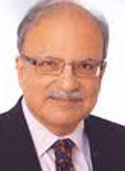
By Shahid Javed Burki
June 29, 2015
Demographic and political developments have come together in more meaningful ways in Muslim countries than in many other parts of the developing world. Muslim populations in these countries are very young with the median age of less than 30 years. In other words, 800 million people in the world’s Muslim population of 1.6 billion are below that age. Most live in urban areas and most are liberal and better educated than older people. Most are unhappy with their situation since the established political and economic orders don’t provide them the space they crave. They could get that space in functioning political systems; in those that are non-inclusive, the young turn to the street to agitate for their rights. Some get attracted to extremist movements and the causes they espouse.
It is important to recognise that the Muslim world is not homogeneous. The western part with 1.2 billion people has had difficulties in making adjustments to the post-colonial period. Stretching from Morocco in the west to Bangladesh in the east, this part can be further divided into two segments; the Arab nations with 255 million people and the non-Arab countries with 925 million. Pakistan and Turkey are two large countries in the latter group. With a combined population of 275 million, they seem to be moving towards a political future that could — perhaps, would — serve as models for the other, more slowly moving nations.
Some of the more important political changes in the Muslim world were spearheaded by the urban youth. They challenged the political and economic systems that had largely excluded them. They struck again with the June 7 elections when Turkish voters delivered a major snub to President Recip Tayyip Erdogan. He had tried desperately hard to get a large majority for his Justice and Development party. He led the AKP three times to decisive electoral victories. The shares of the party in both popular vote and the number of legislators elected to the 550-member parliament increased each time. Erdogan wanted to win 400 seats in the June 2015 elections. That would have given the AKP the majority to change the Turkish Constitution to a presidential form. In the changed system, Erdogan would have wielded even more power than he was allowed when he was prime minister. This move was opposed by all parties in opposition — in particular, by the youth who were now alert to the machinations Erdogan had begun to use to increase his power. In the end, with only 258 seats, the AKP came way short, not even winning a simple a majority to be able to rule the country.
Like all other Muslim countries, Turkey and Pakistan have very young populations. They are not afraid to give voice to their political, economic and social aspirations. It was this expression that gave birth to the Arab Spring of 2011 but the series of those seismic events did not yield the hoped-for political advance. In Libya, Syria and Yemen, political institutions were too weak to stretch themselves to accommodate the awakened youth. The result in these three nations was civil war that has gone on for more than three years, killed hundreds of thousands people, displaced millions more, and destroyed the states. In the fourth country, Egypt, the establishment hit back. Serious divisions among the youth created the space into which the military was able to walk and once again take command of the political system. The youth may have succeeded in ridding the country of authoritarian military rule but they did not have the backing of an institution that could settle their differences. Some of those who had participated in the Arab Spring of January 2011 were upset at the way the Muslim Brotherhood had governed. They took to the street once again.
The current state of political development in Turkey and Pakistan can also be traced to two popular movements. In 2007-08, the legal community in Pakistan was able to galvanise and successfully campaign against the increasingly authoritarian ways of General (retd) Pervez Musharraf, the country’s fourth military president, who had been in power for more than eight years. The legal community was reacting to the military president’s attempt to remove those judges from the higher courts who were not following his line. A year and half after the lawyers first appeared in the street, the president had to resign and — later — face treason charges for tampering with the Constitution. It was also a popular movement in Turkey launched by the young in the spring of 2014 that eventually checked the ambitions of President Erdogan to use the Turkish Constitution to create an imperial presidency. Two years of widespread anti-government protests set off by the plans to raze an Istanbul park and replace it with a mall and a museum brought to the surface the growing resentment among the young, liberal and secular Turks towards the governing AK party.
In earlier times, such movements in Pakistan and Turkey would have been suppressed by the military. In the four decades starting in the 1960s, and ending with the political arrival of the AKP, there was a military coup once every decade. However, with the political rise of the youth and their ability to turn to the street prevented the militaries in the two countries from moving in. They were afraid of popular reaction to any such moves.
What the Turkish elections have shown is that only a working political system will resolve the many different interests of the various groups that constitute the many countries in the Muslim world. The use of force to overcome dissidence can help but only temporarily. The real solution is only in the development of viable and inclusive political orders. Political reform aimed at bringing the young into the system is also important for reducing the appeal of extremism.
Source: http://tribune.com.pk/story/911373/demography-and-politics-in-the-muslim-world/




 Moderate Islamist here
Moderate Islamist here


0 comments:
Post a Comment